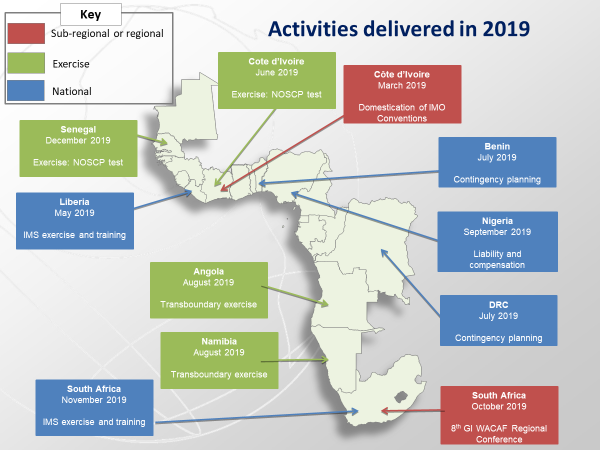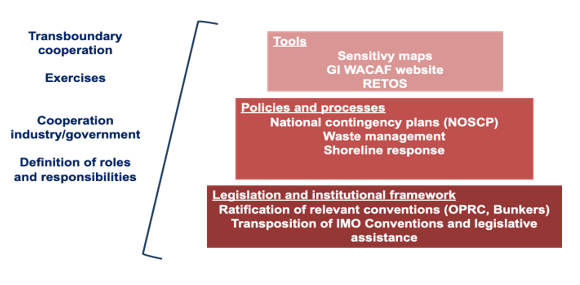2019 has been a very productive year for GI WACAF
GI WACAF is a cooperation project between the International Maritime Organization (IMO) and IPIECA, the global oil and gas industry association for advancing environmental and social performance[1]. It was launched in a shared desire to improve the level of preparedness and response to oil spills in the west, central and southern Africa region. GI WACAF works in close cooperation with relevant national authorities in 22 African countries. By doing so, GI WACAF is contributing to a better protection of the marine and shoreline environment in the region.
As the 2020-2021 biennium is now starting, it is a good time to reflect on what has been achieved during the last 2 years and especially during 2019 as it has been a very rich and productive year.
The end of 2019 marks the completion of the 2018-2019 biennium
In total, GI WACAF has organised or been involved in 11 activities in 2019 in 9 countries: 1 regional conference in South Africa, 1 sub-regional workshop in Côte d’Ivoire; 1 transboundary exercise in Angola and Namibia; 2 national exercises in Côte d’Ivoire and Senegal and 5 national workshops in Liberia, Benin, Democratic Republic of the Congo, Nigeria and South Africa. Not only does it represent a significant increase in the number of activities implemented, but also new kind of activities have been implemented. The Project is constantly adapting to reflect the various needs of the participating countries and of the industry members of the project.

The sub-regional workshop held in Abidjan, Côte d’Ivoire, in March 2019, was one of the highlights of the year as a successful new type of activity for GI WACAF. 6 francophone Western and Central African countries discussed the domestication of IMO conventions in national law. Domestication is a key step that is vital for ensuring that the relevant IMO conventions are fully implemented and enforced at a national level. While national preparedness and response to oil spill systems are enhanced, industry also benefits from the improvement of the legal and institutional framework that reduces regulatory uncertainty and ensures the effective handling of incidents.
Another hallmark of the 2018-2019 biennium was the engagement and collaboration with other entities, projects and programmes involved in oil spill preparedness and response. This culminated with GI WACAF collaborating for the first time with GoGIN (the Gulf of Guinea Interregional Network, an EU funded Project) to implement a joint national training followed by an exercise in Benin in June 2019. It was deemed as key to ensure a coordinated and consistent approach to capacity building in the region. That is why it will remain a priority for 2020-2021.
Conclusions of the 8th Regional Conference and beginning of a new biennium
In October 2019, the 8th Regional Conference of the Project took place in Cape Town, South Africa. Organized every two years at the end of the biennial cycle, the GI WACAF Regional Conference forms an integral part of the management of the GI WACAF Project. The event gathered industry and government focal points from 21 countries across the region with the objective to exchange experiences, review progress achieved, and prioritize project goals for the next biennium. At the end of the 8th Regional Conference high-level recommendations for the biennium 2020-2021 were drafted, based on discussions and conclusions of the working groups. Proposed and agreed by the delegates, these recommendations are promoting a systemic approach to oil spill response and preparedness and will serve as basis for developing the Project’s strategic action plan for the 2020-2021 biennium. The comprehensive recommendations are captured in the full report of the conference available here.

During the Conference delegates stressed the need to push forward with the effective implementation, in all countries of the region, of relevant IMO conventions relating to oil spill preparedness and response, such as the OPRC Convention, as well as those relating to liability and compensation from pollution damage, including the treaty covering liability and compensation from fuel oil (Bunkers 2001 Convention).
Among the recommendations made during the Regional Conference was the organisation of more spill response exercises with neighbouring countries to try to better understand and address the challenges likely to arise during an actual incident. This was highlighted in 2019 by a transboundary table-top exercise between Angola and Namibia organised by GI WACAF in cooperation with national authorities in charge of oil spill preparedness and response in both countries. It was held simultaneously in Luanda and Walvis Bay to test the communication links between Angola and Namibia, test each NOSCP in case of a transboundary oil spill incident and the cooperation mechanisms in the sub-region. Thanks to the participation of the BCC (Benguela Current Commission), 3 South African delegates were invited as Observers.
Data and information collected during the Regional Conference are currently being digested by the GI WACAF team and are being used to draft the strategic action plan for 2020-2021. Once validated, the team will start implementing the selected activities and is looking forward to being back in the region!
[1] IMO and seven member companies contributes to this project. GI WACAF is currently welcoming joining application from potential industry members operating in West, Central and Southern Africa. If interested, please contact Julien Favier, GI WACAF Project Manager (Julien.favier@ipieca.org).
